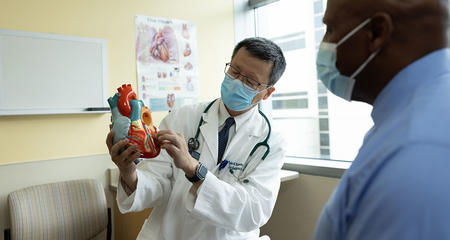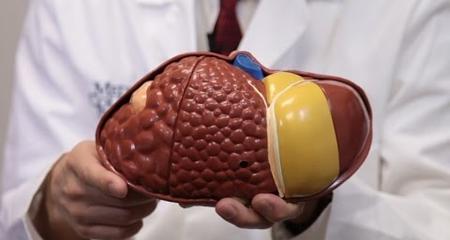Our End-Stage Liver Disease and Liver Transplant Program has been part of a pioneering program since 1983, when we performed Wisconsin’s first liver transplant. In 1999, we performed the state’s first live donor liver transplant. In 2013, we performed the first in situ split-liver transplant, where a deceased donor’s liver was divided into two functional liver grafts, saving two lives from a single organ. Our liver transplant program is the only one in eastern Wisconsin that provides this expertise.
Our program is nationally distinguished by its superior survival rates, experienced physicians and innovative research. The program is part of the Transplant Center, a joint program of Children’s Wisconsin and Froedtert Hospital with vital support by Versiti Blood Center of Wisconsin for tissue typing and research initiatives. The program is certified for liver transplantation by the Centers for Medicare and Medicaid.
Get answers to frequently asked questions.
Superior Liver Transplant Patient Survival
Froedtert Hospital’s End-Stage Liver Disease and Liver Transplant Program offers consistent excellence in liver transplant survival outcomes that meet or exceed national benchmarks. For the most current outcomes, visit the Scientific Registry of Transplant Recipients (SRTR).
Physicians Referrals and Appointment Requests
Exceptional Liver Transplant Care
Our program delivers strong multidisciplinary care with highly experienced physicians and expertise in a wide range of specialties. This is critical, because patients with end-stage liver disease often have underlying conditions such as diabetes, hypertension, lipid disorders and osteoporosis. They also are prone to complications of liver disease, such as cirrhosis. Through the breadth of specialties and resources available, we adeptly provide care that encompasses all patient needs.
The team includes hepatologists and transplant surgeons, who are joined by experienced transplant coordinators, transplant nurse practitioners, physician assistants, nurses, social workers, psychologists, registered dietitians, financial liaisons and other transplant specialists.
The goal is to ensure patients are as healthy as possible when they undergo liver transplant or donation surgery. After surgery, liver transplant recipients and donors recover on a patient care unit dedicated to transplant patient care.
International Patients
We are here to help international patients arrange for their care at Froedtert Hospital in Milwaukee, Wisconsin.
Your Care Team for Life
With patients as our focus, liver transplant recipients and donors receive care that is coordinated and collaborative. Patients are seen as soon as possible for an initial consultation after they contact our program.
Care team members tailor transplant care to each patient. They become familiar faces to patients and families and offer a sense of comfort and security before, during and after surgery. Staff at our Liver Transplant Clinic for post-transplant care answer questions and provide checkups and other resources. The care team is here to support you in your life-long commitment to complying with post-transplant care guidelines and staying healthy.
Innovative Research and Care
Physicians at Froedtert & the Medical College of Wisconsin Froedtert Hospital participate in research that advances the development of new and more effective treatments for end-stage liver disease patients. Ongoing clinical trials are available for eligible patients.
FAQ and Resources
-
I’ve been told I have Hepatitis C. Is it fatal?
Not necessarily. While Hepatitis C can lead to liver failure, the disease is not an automatic death sentence. Only about 20 percent of patients with Hepatitis C will eventually progress to the point of needing a life-saving transplant. Highly effective therapy to cure hepatitis C is routinely used by our hepatologists to treat eligible patients.
-
How badly is my liver damaged?
Specific blood tests and a liver biopsy are the best way to tell how much damage has been done to the liver.
-
What is a liver biopsy?
A liver biopsy is an outpatient procedure to obtain a small piece of the liver for testing under the microscope. It is the gold standard for determining the extent of your liver disease and your liver’s ability to function. For the procedure, the area is cleansed with a sterile solution. A local anesthetic is used and a small needle is inserted between the ribs into the liver to obtain a sample. Recovery takes about two to three hours, and patients go home the same day with instructions to avoid any heavy lifting for a few days. The risks associated with a liver biopsy are minimal. We safely perform hundreds of liver biopsies each year at Froedtert Hospital.
-
Will I need a transplant?
Whether or not you’ll need a transplant can best be determined based on information obtained from a liver biopsy, blood tests, clinical evaluation and a detailed conversation with your hepatologist about your disease and the risks and benefits of a transplant.
-
Should I ask to be put on a transplant list?
Before you ask to be placed on a transplant list, you should understand your condition as completely as possible as well as the pros and cons of receiving a transplant. In some cases, you might be better off without a transplant. That may change in the future if your disease changes, but understanding your disease and all the options open to you, as well as the risks of each option, will help you make an informed decision. It’s our job to monitor you and know when to start thinking of a transplant.
-
How are people placed on a waiting list for a liver transplant?
After undergoing a thorough evaluation, eligible patients are placed on a national transplant waiting list based on the severity of their liver disease, ensuring that the sickest patients receive organs first, regardless of how long they’ve been on the list. Patients with acute liver failure, for example, are placed at the top of the list because of their immediate need for a transplant.
-
How is the severity of my condition determined?
After undergoing a thorough evaluation, eligible patients are placed on a national transplant waiting list based on the severity of their liver disease, ensuring that the sickest patients receive organs first, regardless of how long they’ve been on the list. Patients with acute liver failure, for example, are placed at the top of the list because of their immediate need for a transplant.
-
How long is the waiting time?
Wait list placement is based on the MELD score, ensuring that the sickest patients receive organs first, regardless of how long they’ve been on the list. Patients with acute liver failure, for example, are placed at the top of the list because of their immediate need for a transplant.
-
Does it help to get on a list sooner?
No. Being on the list longer does not mean a patient will receive a liver any sooner.
-
Can a person be on more than one waiting list?
Yes. Some patients will ask to be put on a waiting list in more than one region because the waiting times may be longer in their home region.
-
What might make me unable to receive a liver transplant?
Several conditions might make a patient ineligible for a liver transplant. The most common are advanced heart or lung disease that would make the surgery risky, and liver cancer that is beyond the transplant criteria or has spread outside of the liver. Cessation of alcohol, tobacco and recreational drug use and adequate rehabilitation are also mandatory for patients who had history of using these substances.
-
Where can I find answers to additional questions about liver transplant?
More information is available through the following resources:
- United Network for Organ Sharing (UNOS)
Scientific Registry of Transplant Recipients
Transplant Living
American Liver FoundationLearn about our Transplant Center partners, Children’s Wisconsin, Versiti Blood Center of Wisconsin and the Medical College of Wisconsin.
Recognized as High Performing by U.S. News & World Report
Froedtert Hospital is recognized by U.S. News & World Report as high performing in three adult specialties and 16 procedures and conditions, including gastroenterology and GI surgery.More to Explore





